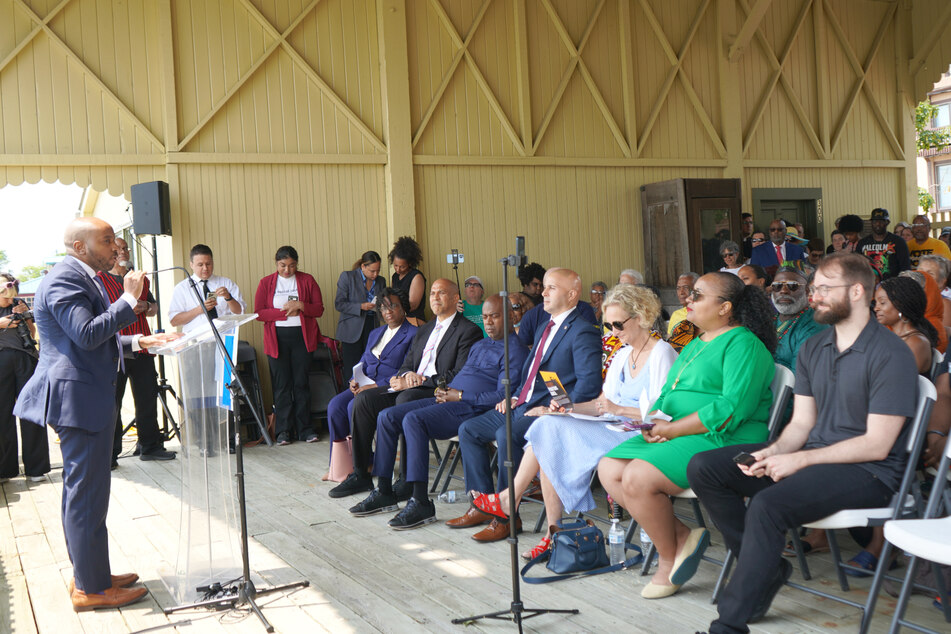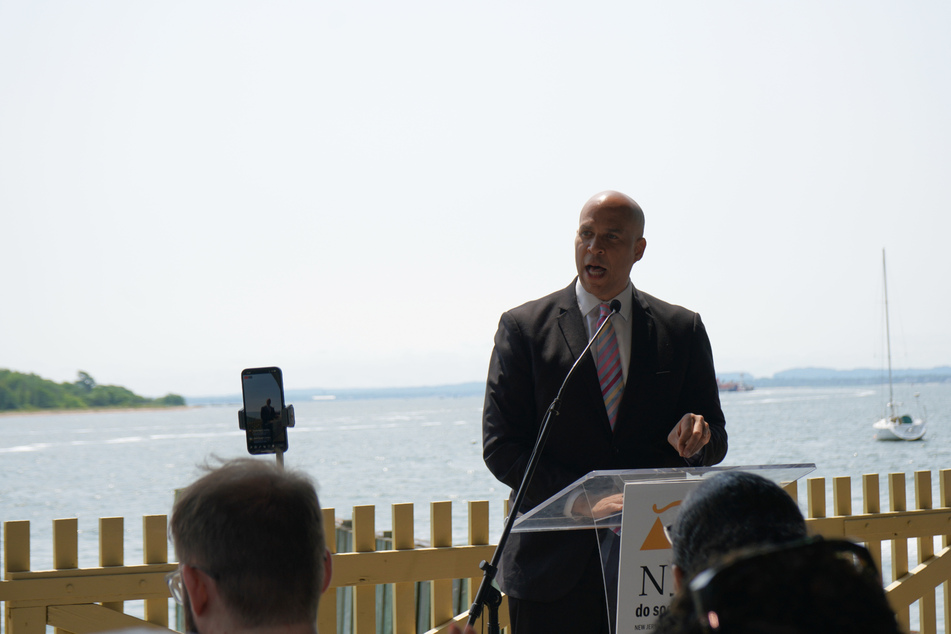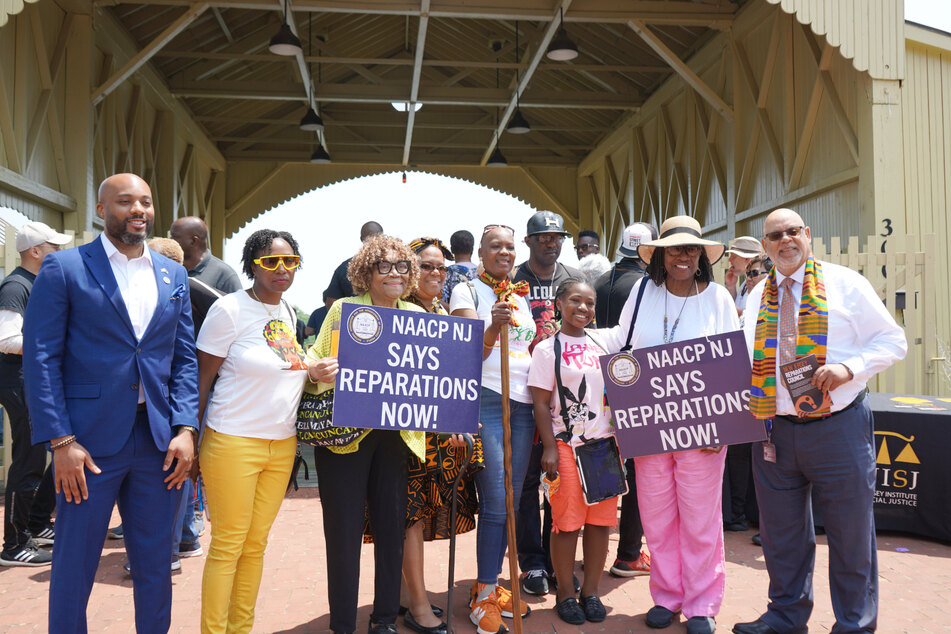New Jersey Reparations Council holds Juneteenth launch event at historic site tied to slavery
Perth Amboy, New Jersey - Activists and elected officials celebrated the creation of a first-of-its-kind reparations council in New Jersey on Monday at a historic site.

The Perth Amboy Ferry Slip seemed like a slice of paradise. The sun was shinning with the help of clear blue skies. The waves from the Hudson River crashed gently against the shoreline. Families visited a nearby ice cream shop, while enjoying the amazing weather and quaint surroundings.
While it's easy to get swept up in the beauty of the area, the place actually has a dark history that many, even those native to Perth Amboy, are unaware of – a history that's not even included on its Wikipedia page.
The very first boat that came to New Jersey filled with enslaved Africans docked at the Ferry Slip in the 1600s.
New Jersey went on to build a reputation as the most aggressive slave state in the North, having more than two-thirds of all enslaved Black people above the Mason-Dixon Line by 1830, and being the last Northern state to abolish the act in 1866.
Today, the state is the most racially diverse in the US, but the ill effects of slavery still impact Black communities, creating some of the worst racial inequities in the nation.
These factors have inspired the New Jersey Institute for Social Justice (NJISJ) to team up with local elected officials, activists, professors, and experts to form the New Jersey Reparations Council.
Members of the council and supporters held a launch event at the ferry on Juneteenth, sending a powerful message to the rest of the nation that the often overlooked, horrific history of slavery will not be forgotten in New Jersey, and that extensive study into that dark past will help the state create a better tomorrow for everyone.
The origins of the New Jersey Reparations Council

In 2019, Assemblywoman Shavonda Sumter and the Legislative Black Caucus introduced a state bill aimed at creating a reparations task force that would extensively study the lasting impact of slavery on Black communities today.
Unfortunately, the bill has languished ever since, never even receiving a committee hearing.
The NJISJ felt that they could no longer wait for the legislation to pass to simply explore these issues. That's why they decided to go ahead and create a council even without the state government's seal of approval.
During the launch event, guest speakers including Sumter, Newark Mayor Ras Baraka, and New Jersey Senator Cory Booker shared why they support the creation of the council.
Sumter recounted the pushback from officials when she brought forth her bill, who took issue with her use of the word "reparations." But as someone who puts an emphasis on speaking truth to power, she pushed back, insisting that they simply "say the word."
Mayor Baraka shared that he and other politicians "fight everyday trying to remedy problems that we didn't create." He emphasized that the issues the council will study involve things the Black community desperately needs to thrive, such as quality education, health care, and neighborhoods.
Booker, who sponsored the reintroduction of a federal reparations bill, told the audience that reparations are "not a radical concept," and that the need to study such ideas is now more important than ever as some are "trying to whitewash or sanitize our history."
Above all, the council seeks to find multiple answers to one burning question: "What kind of reparative systems does New Jersey need to build and invest in for Black people to thrive?"
The plan ahead for the New Jersey Reparations Council

Ryan Haygood, the CEO and President of the NJISJ, comprehensively laid out the dark past of the site the launch event was held at, detailing how enslaved Black people braved the brutal trip across the Atlantic Ocean, only to be "sold into a system of slavery that endured for more than 200 years."
But even after the state abolished slavery, racist practices that suppressed the Black community continued, among them a form of sharecropping known as "cottaging," exclusionary zoning, and redlining.
"[This council] matters not only because we must never forget," Haygood explained, "but also because we can draw a direct line from our shameful history to the racial disparities that Black people in New Jersey face, some of the worst in America in every direction."
"We are looking for policies that will go beyond harm reduction and will be an answer to the question of what it will take to fundamentally empower Black New Jerseyans, so they will be truly liberated and thrive," he added.
New Jersey aims to "confront and repair"
The council, made up of nine committees dedicated to a range of related issues, plans to study the state's racial history for the next two years, and will make recommendations for reparative justice policies in New Jersey based on their findings.
Activist Larry Hamm, a member of the committee studying democracy and voter suppression within the state, called it an insult and an abomination to the Black community "that we can't even get a bill out of committee to study the issue of reparations."
Khalil Gibran Muhammad, a co-chair of the council and Professor at the Harvard Kennedy School, joked that the committees aimed to produce "the receipts – the evidence, the facts," as some US state officials are working to suppress the teaching of Black history. He noted that this problem isn't just an issue in southern states like Florida and Texas, but has been quietly going on for years, even in northern states.
Jean-Pierre Brutus, the council's convenor, drove the point home by saying: "Given the generations of unaddressed, compounded, and systemic racial oppression that advantaged white people at the expense of Black people, how could New Jersey not suffer from the vast racial disparities that we have today?"
"Our self-generated narrative has forestalled our reckoning and our acknowledgment that when it comes to racial justice, we have a long way to go," he insisted. "The time has come to confront and repair."
Cover photo: TAG24/Rey Harris

